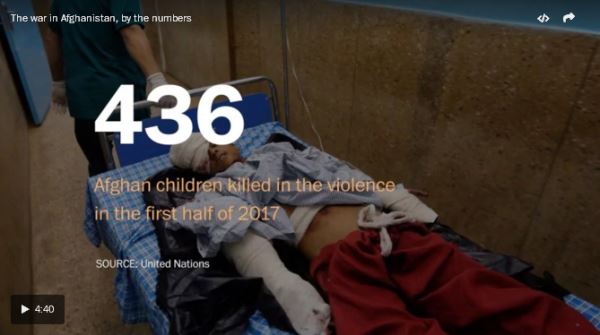KABUL — When Yar Mohammad Mohammadi joined the municipal street cleaning crew here over a decade ago, he was expecting some unpleasant tasks. But nothing prepared him for the grim debris he encountered after a bloody bombing in central Kabul last month.
“We found hands, feet — even a head,” recalled Mohammadi, 40. “I couldn’t eat for the next two days. I was horrified.”
For the cleaners, clearing away and carting off body parts has become a grisly but routine chore in the Afghan capital, where suicide bombings and commando attacks by extremist insurgents take place almost every month. The United Nations on Thursday reported that more than 3,400 civilians were killed in the country in 2017, many in attacks targeting public places.
[Afghans, fearing more insurgent violence, feel abandoned by struggling government]
Just three weeks ago, at 12:45 in the afternoon, a white ambulance carrying a load of explosives detonated on a crowded downtown street, near a public hospital, a police compound and an antique market.

A member of Afghan security forces walks past a building damaged by a suicide attack in Kabul. (Rahmat Gul/AP)The human toll from the powerful bomb was unusually high — at least 105 people killed and 235 wounded. The physical destruction was also extensive; cars were crumpled like paper, and buildings were left with collapsed roofs, shattered windows and charred walls.
Security forces quickly cordoned off the area, then detectives arrived to investigate. After five hours, they left. Then about 250 municipal cleaners, wearing bright orange coveralls and shouldering shovels, moved in.
“Be careful, don’t hurt yourselves,” Ahmad Behzad Ghayasi, the cleaning department director, told the men as they swept up shards of glass in one hospital building.
Excavators loaded debris and charred car parts onto open trucks, and Ghayasi pointed to a ruined building nearby. “There might be dead bodies,” he said.
Even on a normal day, the job requires stamina and a strong stomach. Workers must sweep streets, clear fetid drain ditches and collect garbage in a crowded, dirty capital of about 5 million, with grossly inadequate sanitation and trash dumped on many corners. They are exposed to toxic air pollution and respiratory diseases.
But it is the psychological pressure of cleaning bomb blast sites that weighs most heavily. Powerful explosions can tear human bodies into unrecognizable pieces. Even after police and health workers have carried wounded victims to hospitals and corpses to morgues, bits of flesh and bone often remain behind.
[In Kabul, access to safe drinking water is a matter of money]

Oct. 7, 2017 marks 16 years since the start of the U.S. war in Afghanistan. Here are key numbers to know about how that conflict.(Sarah Parnass/The Washington Post)
The cleaners wash bloodstains and collect body parts in plastic bags or carts. Later, out of respect, they bury them in the nearest cemetery; some end up in one grave with no marker.
Ghayasi said he usually sends out teams to clean after small explosions, but he takes charge if the blast is especially deadly and destructive. He has done so three times in the past year.
“It shatters our spirits into pieces,” Ghayasi said.
As insurgent violence surges throughout the country, bombings and ground assaults in the capital have also steadily increased. In the past two years, attacks claimed by the Taliban or the Islamic State have targeted at least eight mosques, a peaceful rally, two security academies, hotels, government buildings, and Afghan and foreign military convoys.
In May, when a massive truck bomb in Kabul killed more than 150 people and destroyed several large buildings including the German Embassy, it took days for about 500 city cleaners to clear the ruins. Afterward, the office of President Ashraf Ghani gave them a bonus equal to one month’s salary.
Last March, when the Taliban attacked a police station in west Kabul, a cleaner said he found two human legs at the scene.
“When I go home after cleaning a blast site, I act strangely,” said Hussain Bakhsh, 60, who cleaned the sites of both the recent ambulance bomb and the earlier truck bomb. “The kids ask me, ‘What happened to you?’ It has a negative effect on our mental health.”
The municipality has no clinic to treat mental health problems, such as post-traumatic stress, and the cleaning department is badly understaffed. Even with 3,625 employees and 2,000 additional contractors, officials said, it is not enough to keep the capital clean.
Since the recent spate of bombing and shooting attacks, the municipality has created an emergency response team of about 250 workers who perform normal duties most days but are ready to rush to blast scenes if needed.
The average wage for a city cleaner is 8,000 afghanis per month, which equals about $110. All are low-skilled workers with little education. Despite the hardships and trauma that come with the task, few have other options.
“It is a disturbing scene, but we have to work,” said Rajab, 49, who uses only one name. After the midday ambulance bombing Jan. 27, he and his co-workers were still sweeping and shoveling after 9 p.m. The next morning, they were back again.
City officials promised them another bonus.
(The Washington Post)